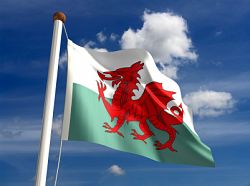

As we head towards a new political landscape, our Barbour writing team will pick out the key policies, pledges and manifesto talking points from all the main political parties that are going to affect you. We'll keep you in the loop leading up to the General Election, and after it, so you won't miss a thing!
The Plaid Cymru Party of Wales have proposed a number of policies related to planning and climate change and energy.
Climate change and energy
The party reaffirms their commitment to reaching net zero targets in Wales by 2035 and reversing biodiversity decline by 2030 which, they believe, requires collaboration and planning to achieve a just transition.
Primarily, the party propose a Welsh Green New Deal which would create work in the emerging green and net-zero sector, and includes re-skilling and supporting Welsh employees and apprentices into these sectors, meeting the need associated with demographic change in the manufacturing workforce and the skills shortages already identified. As part of the move towards net-zero, they also hope to establish a Just Transition Commission.
Plaid Cymru believes that greater investment is direly needed in green jobs and transitioning into new methods of construction, so that workers in Wales are not thrown on the scrap heap, but are supported into new, highly-skilled and well-paid jobs. They would prioritise work to alleviate the effects of climate change on communities.
They think that the school curriculum should equip young people with an understanding of climate challenges and encourage a philosophy of engaging with climate change and the natural world. They aim to ensure that both the Welsh Government and the UK Government takes their responsibilities to protecting households seriously by investing in infrastructure to prevent or mitigate flooding incidents.
They also plan to increase Air Passenger Duty and kerosene tax for private jets.
Plaid Cymru opposes Tata’s current plans for the closure of its blast furnaces in Port Talbot and look to nationalise the Port Talbot steelworks. Failing this, they believe the Welsh Government should explore options for the compulsory purchase of the plant while future options for greening steel production – including through replacing coal with green hydrogen – are developed.
They also plan to call on the next UK Government to consider adopting alternative ways of measuring the economy such as introducing a Business, Human Rights and Environment Bill. This would mandate that private companies conduct due diligence in their supply chains to prevent human rights abuses and environmental harms. The mechanism for enforcement would be modelled on the ‘duty to prevent’, as seen in the Bribery Act 2010.
Their primary aims are for Wales to:
The party also hopes to increase fairness for energy by:
In terms of the Nature Emergency, they support a science-led plan aligned with the 2022 Kunming-Montreal agreement to ensure that nature loss is reversed as soon as possible with the introduction of biodiversity targets, to halt biodiversity decline by 2030, and ensure substantive recovery by 2050. They aim to ensure that planning projects have to have regard to the two emergencies, to avoid situations like wind farms being built on landscapes that provide habitats for endangered species.
Planning
Plaid Cymru want to reform the planning system so that it is consistent with local needs and aspirations, rather than reflecting the interests of developers. This would involve maintaining up-to-date information on housing need and ensuring that developments reflect this need. This would be supported by funding packages to assist local government to robustly enforce planning decisions ensuring that developers stick to agreements. They also aim to ensure that Local Development Plans are not imposed upon local planning authorities without their support.
For more information, see the: